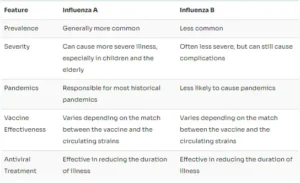Imagine waking up feeling fine, only to find yourself shivering under a mountain of blankets a few days later. The flu has struck you, a viral invader who seems to know just how to ruin your plans. But what if the flu isn’t content with one visit? Can it return for a second round, leaving you feeling even worse?
The flu, or influenza, is a highly contagious respiratory illness caused by influenza viruses. It’s common during the same flu season, which typically runs from fall to spring. While most people recover from the flu without complications, it can be severe and even life-threatening for certain populations.
So, can you get the flu twice in a single season? The answer might surprise you. Let’s explore the information about influenza and determine if this virus can strike twice.
How Does The Flu Work?
The flu virus primarily targets the respiratory system, including the nose, throat, and lungs. It spreads through tiny droplets when an infected person coughs, sneezes, or talks. Once inhaled, the virus enters the body and attaches to cells in the respiratory illnesses, replicating, ear infections, and spreading throughout the body. This process triggers the immune system to respond, leading to symptoms such as fever, cough, sore throat, muscle aches, and fatigue.
According to the Centers for Disease Control and Prevention (CDC), the flu can cause mild to severe illness, and complications like pneumonia can arise, especially in high-risk groups such as the elderly, young children, and those with chronic health conditions.
Can You Get The Flu Back To Back?
Yes, it is possible to get the flu more than once in a season. The flu virus mutates frequently, leading to different strains circulating each year. If you’re exposed to a different strain than the one you previously had, your body may not recognize it, making you susceptible to another infection.
The National Institutes of Health (NIH) states that while your body develops some immunity after recovering from the flu, this immunity is strain-specific and may not protect against other circulating strains.
Is Flu A or B Worse?
While both influenza A and B can cause severe illness, hospitalization, and death, it’s difficult to say which one is “worse.” The severity of flu illness can vary depending on factors such as the individual’s age, overall health, and the specific strain of the virus.
Here’s a table comparing some key characteristics of influenza A and B:
How Long Are You Immune To Flu After Having It?
After having the flu, immunity typically lasts for about 3-6 months. This immunity is specific to the strain you were infected with, so protection may not extend to other flu strains or variants. The flu virus mutates rapidly, which means new strains can emerge and cause reinfection even if you’ve recently recovered from the flu.
The study explains that immunity to the flu is generally short-lived and specific to the strain you were infected with. This is why annual flu vaccination is recommended to protect against the most current strains.
How To Prevent It?
Preventing the flu involves a combination of vaccination, hygiene practices, and lifestyle choices:
- Vaccination: The annual flu vaccine is the most effective way to prevent the flu. It is updated yearly to protect against the most prevalent strains.
- Hand Hygiene: Regular handwashing with soap and water or using hand sanitizer can reduce the spread of the virus.
- Avoid Close Contact: Keep a distance from those who are sick, and avoid touching your face, especially your eyes, nose, and mouth.
- Boost Your Immune System: A healthy diet, regular exercise, adequate sleep, and managing stress can help strengthen your immune system.
Best Way To Get Rid of The Flu
If you do catch the flu, the following steps can help you recover more quickly:
Rest: Your body needs energy to fight off the influenza virus, so getting plenty of rest is crucial.
Hydration: Drink fluids like water, herbal teas, and broths to stay hydrated and help loosen mucus.
Medications: Over-the-counter medications and a seasonal flu shot can relieve most flu symptoms such as fever, aches, sore throat, and congestion. Antiviral drugs may be prescribed by a doctor to reduce the severity and duration of the flu.
Nutrient-Rich Foods: Eating foods rich in vitamins C and D, as well as zinc, can support your immune system during recovery.
The CDC recommends staying home and avoiding contact with others until you’ve been fever-free for at least 24 hours without the use of fever-reducing medications.
When To See A Doctor?
While most cases of the flu can be managed at home, it’s important to seek medical attention if you experience any of the following:
- Difficulty breathing or shortness of breath
- Chest pain or pressure
- Sudden dizziness, body aches, or confusion
- Severe or persistent vomiting
- Chronic medical conditions
- Common flu symptoms that improve but then return with fever and a worse cough
High-risk individuals, such as the elderly, pregnant women, and those with chronic conditions, should contact their healthcare provider at the first sign of flu symptoms.
Frequently Asked Questions
No schema found.– Disclaimer –
This blog is for informational & educational purposes only and does not intend to substitute any professional medical advice or consultation. For any health-related concerns, please consult with your physician, or call 911.
-
About The Author
Dr. Syra Hanif M.D.Board Certified Primary Care Physician
Dr. Syra Hanif is a board-certified Primary Care Physician (PCP) dedicated to providing compassionate, patient-centered healthcare.
Read More








